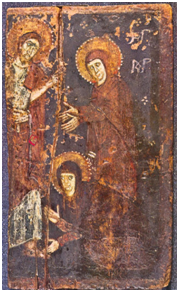THOUGHTS FROM OUR DISCUSSION – MAY 8
SCRIPTURE:
If women’s presence and leadership/ministries are so difficult to find in the New Testament, why should we read Scripture today?
Elizabeth Schussler Fiorenza writes, The Christian gospel cannot be proclaimed if the women disciples and what they have done are not remembered… The Bible is not just a historical collection of writings but also Holy Scripture, gospel, for Christians today… Yet as long as the stories and history of women in the beginnings of early Christianity are not theologically conceptualized as an integral part of the proclamation of the gospel, biblical texts and traditions formulated and codified by men will remain oppressive to women. (from In Memory of Her, p. xiv-xv)
From our discussion: Christian ‘scripture’ and ‘tradition’ are not two separate influences on the Christian faith, but intimately connected. Before our Bible became ‘scripture’ (Latin scriptura, ‘writing’) – it was oral history – that is, it was passed along orally (Latin traditio, ‘handed over’) from one story-teller to another. Eventually, Christian traditions about Jesus and his community were written down (and became the Gospels); later, four of those Gospels were adopted as part of the ‘canon’ (recognized as ‘Scripture’).
What do you think? What is ‘Scripture’ and what is its role in your life today?
TRADITION:
Why is it so important to explore ancient history (Tradition),when trying to change the modern church?
Hans Kung writes, [Following Jesus’ example, early] Christianity could have encouraged women’s liberation, and should have done more than just providing alternative forms of life [for women]. Instead, a shift took place in the 2nd and 3rd centuries, as hostility to women increased. The political and dogmatic growth of orthodoxy increasingly resisted the emancipation of women in church and society. But in respect of the present day [today’s Roman Catholic, Orthodox, and many Protestant traditions] it must be said that what may still have been ‘understandable’ for the Christianity of the Hellenistic paradigm of the early church becomes completely incomprehensible if open or latent discrimination against women in Christian churches is still grounded in – and maintained with the support of – ‘Church Tradition’. (from Women in Christianity, p. 26)
From our discussion: Today’s Roman Catholic Church, the Orthodox Churches, and many Protestant denominations still exclude women from leadership roles, principally because of the way they interpret “the tradition established by Jesus and his first disciples.” But Hans Kung, his team and many other modern scholars have recovered another ‘Tradition’ established by Jesus.
What do you think? What is ‘The ‘Tradition’ recognized by today’s Church?
- Who established that ‘Tradition’?
- Can modern historians bring us closer to the real ‘Tradition’ as known by Jesus and his first disciples?
WOMEN’S VOICES:
In our own time, we are learning that in Christian history – both ‘Scripture’ and ‘Tradition’ – women’s presence and voices were edited away as the centuries passed. But today modern scholars (including many women scholars) are returning these women to our common history.

Mary Magdalene in the Garden – icon at St. Catherine’s, Mt. Sinai
The story of Mary Magdalene is an excellent example of how history obscured a woman leader, and what modern historians are reclaiming.
We will never be able to interview ‘the real Mary Magdalene’, the follower (disciple) of Jesus, so we can only look at what the Scripture and the Tradition tell us.
When we look at Scripture (see Luke 8:1-3, Mary and the other women who accompanied Jesus, and John 20:1-18, Mary the witness to – and preacher of – Jesus’ Resurrection), we see a strong woman who was a devoted follower of Jesus, even – as some early oral traditions passed on – the ‘Apostle to the Apostles.’
But when we look at Church Tradition, we see that by the sixth century Mary Magdalene had become a repentant prostitute, and even in the 21st century the Church is still arguing that Jesus had no women disciples.
What do you think of Mary Magdalene?
- What’s her real story?
- What can we do to get her ‘history’ corrected in Church Tradition?
- If Mary Magdalene’s ministry – and the ministries of other women disciples – were more accurately remembered, what ministry roles could today’s women take in the Church?
